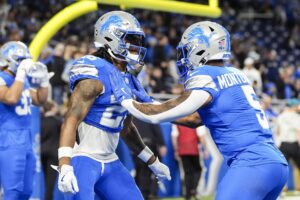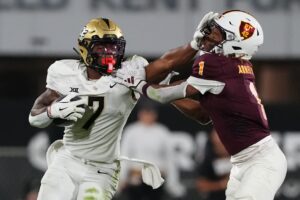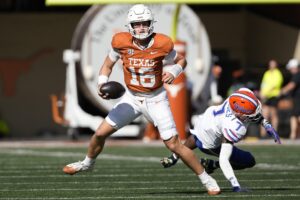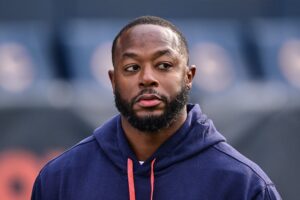During the month of August, the writers at Last Word on Pro Football will be breaking down every division in the league by position. This article contains a position-by-position breakdown of the North offenses. The breakdown will contain “the best” at each unit followed by “the rest” in descending order.
2017 NFC North Breakdown by Position: The Offense
Quarterback
The Best: Green Bay Packers
The Rest: Detroit Lions, Minnesota Vikings, Chicago Bears
It’s nearly indisputable that Aaron Rodgers is a top-two quarterback in the league. The Green Bay Packers have been fortunate to have a man under center who can do incredibly special things with the football. Put simply, Rodgers is a pure, all-around playmaker. He can throw the ball with a rare blend of top-notch arm strength and great accuracy. Rodgers is known for being the “Hail Mary King” for his unreal 60-yard downfield throws that somehow, someway find their way into the hands of his receivers. Multiple games have been won for the Packers on a walk-off Hail Mary by their gunslinger.
What’s truly scary about the Packers quarterback, however, is that he can devastate defenses with his legs as well as his arm. Let Rodgers escape the pocket, and if he doesn’t rip off a rush against that defense, he’s going to be able to toss the ball on the move with pinpoint accuracy. Rodgers is arguably even more dangerous scrambling than he is in the pocket.
The next best man at quarterback in the NFC North is Matthew Stafford. The talented man under center for the Lions has had a nice career thus far, though he has found no playoff success of any sort. He’s thrown for at least 4,200 yards and 20 or more touchdowns every season of his career since 2011, painting a picture of consistency and high-level production. He could cement his status as an elite quarterback by leading the Lions to their first playoff win since 1991.
The Vikings high-profile 2016 trade acquisition, Sam Bradford, has performed surprisingly well since coming to Minnesota after an injury to former starter Teddy Bridgewater. Bradford isn’t an exciting or elite player by any means, but last season he was solid and reliable, which is as much as the Vikings could’ve asked of him. One way Bradford did turn heads was by setting the record for highest completion percentage in a season, connecting on a staggering 71.6% of his passes.
Who is the Chicago Bears quarterback? Is it Mike Glennon, former Tampa Bay Buccaneer who hasn’t shown a lot of promise as a starter? Is it second overall draft pick Mitchell Trubisky, who has shown loads of potential in the preseason? Nobody is quite sure yet, but either way, Chicago’s quarterbacks are all unproven as starters, landing them in the last slot in the division.
Running Back
The Best: Chicago Bears
The Rest: Minnesota Vikings, Detroit Lions, Green Bay Packers
The NFC North isn’t a running back dominated division like it used to be. However, a couple great talents are still there. The most notable running back in the division is unquestionably Jordan Howard of the Chicago Bears. This unheralded fifth-round pick burst onto the scene as a rookie last season and he was second in the league in rushing, having piled up 1,313 yards. He flashed the capabilities of an elite back last season, and if he continues to produce, Howard could be a top-five runner in the league.
Youth seems to be the trend at the running back position at the top of the NFC North. After the departure of longtime face of the franchise Adrian Peterson, Minnesota drafted much-heralded Florida State rookie Dalvin Cook. Cook has been turning heads both in camp and in preseason games. If his production translates into the regular season, he could be one of the best in the league. Behind Cook, the Vikings backfield is fairly deep as well. Former Oakland Raider Latavius Murray is second on the depth chart, and he’s proven to be solid. Jerick McKinnon will also be a factor with his great speed and receiving ability.
The Lions backfield is third in the division. Though there is abundant talent, the unit as a whole is a big question mark. Whether it be Ameer Abdullah, Zach Zenner, or Theo Riddick, all of the backs are capable runners with different skill sets. The only issue is that nobody can ever stay healthy. If all three of these players are healthy enough to see the field, the backfield in Detroit could be formidable.
Green Bay comes in last in the division when it comes to runners. Their starter in the backfield isn’t even a true running back. Ty Montgomery was switched to the position from receiver last year. While he wasn’t terrible, his play wasn’t overly impressive either. The Packers did draft three runnings backs however, and if any of those players perform well, Green Bay could easily rise.
Wide Receiver
The Best: Green Bay Packers
The Rest: Minnesota Vikings, Detroit Lions, Chicago Bears
Are the Packers receivers truly the best, or does Rodgers just make them look that way? Either way, they’re at the top of these rankings. Starters Jordy Nelson, Davante Adams, and Randall Cobb form a talented trio of targets in Green Bay. Both Adams and Nelson had double digit touchdowns last season. Yardage wise, Adams was three yards shy of 1000, while Nelson was well over. The production from the Green Bay receivers just wasn’t matched throughout the rest of the NFC North.
The Minnesota Viking receivers have so much potential. The talent is obvious and abundant, but the offense is too conservative for huge numbers. Instead, Stefon Diggs and Adam Thielen made their mark on the NFL with consistency and reliability. Former practice squad member Thielen broke out this past season with 69 receptions for 967 yards and five touchdowns. There were only 13 times all season where Thielen didn’t make the catch when targeted. Diggs had a fairly similar stat line, catching 84 passes for 903 yards and three touchdowns. Factor in second-year man Laquon Treadwell and rookies Stacey Coley and Rodney Adams, and this wide receiver group is as deep as it is talented.
The Lions were almost dead even with Minnesota at receiver, but Minnesota ultimately edged them out because of depth and consistency. Detroit has a very talented pair of receivers in Marvin Jones Jr. and Golden Tate, who combined for eight touchdowns and just over 2,000 yards. Neither receiver was all that consistent in their production though. Jones caught just over half his targets, which isn’t something to brag about. In addition to that, he also never scored after week six, and in four games, which is a quarter of the season, he had less than 20 receiving yards. The complaints to be had against Tate were similar, though by no means the same. Tate never saw the end zone until week six, though he had only two games with less than 20 yards.
Who are the Bears receivers? At this point, it’s hard to tell. Chicago doesn’t have any household names anymore now that Alshon Jeffery is gone. The 6’3″ man Cameron Meredith was the biggest candidate to take over that number one spot full time, yet tore his ACL and will be out for the year. The Bears will rely on Kevin White, who has a chance to be very good if he can ever stay on the field. That’s the problem. White just can’t stay on the field thus far in his career. This off-season the Bears added some depth with former Pittsburgh Steeler Markus Wheaton.
Tight End
The Best: Minnesota Vikings
The Rest: Detroit Lions, Green Bay Packers, Chicago Bears
Minnesota’s Kyle Rudolph is the most reliable, all-around talent at tight end in the division. He’s a good pass-catcher, a decent blocker, and he’s durable. He’s never a question mark on the Vikings offense and provides some stability and consistency.
Eric Ebron is frustrating. He can’t block, but his receiving talent is undeniable if he can just cut the drops. Essentially, he’s a big, incredibly athletic receiver playing tight end. If Ebron can stay healthy and not drop the ball, he could be a major mismatch for defenses and take Detroit’s offense up a level.
The Packers acquired a talented tight end in Martellus Bennett, but nobody knows how much he will play. In recent history Aaron Rodgers hasn’t thrown to his tight ends much, and that may impact Bennett’s production. Regardless of how much he’s targeted though, Bennett is undeniably a solid player.
Right now, the Bears tight end situation seems rather uncertain. Dion Sims seems to have taken over Zach Miller‘s starting job, and rookie Adam Shaheen may be a factor as well. The apparent starter, Sims, hasn’t been very productive so far in his five-year career. He only has 74 receptions, 699 yards, and five scores over his NFL career. Whether that was from a lack of use or a lack of ability will remain to be seen with Chicago this season.
Offensive Line:
The Best: Chicago Bears
The Rest: Green Bay Packers, Detroit Lions, Minnesota Vikings
Quietly, the Chicago Bear have actually built a very respectable offensive line. Their interior offensive line is one of the league’s best. Center Cody Whitehair and guards Kyle Long and Josh Sitton will be a brick wall for opposing pass-rushers. The only question marks on this line are at tackle. Starters Bobby Massie and Charles Leno should play at least decently, but are far from elite options.
It’s fitting that one of the NFL’s most productive offenses has one of the better offensive. The departures of J.C. Tretter and T.J. Lang are notable, but the Packers signed capable replacements in Jahri Evans and Corey Linsley. Much the opposite of Chicago, Green Bay has great tackles but a questionable interior line. They should, however, still be one of the better lines in football.
The Vikings line was amongst the worst in the NFL last year, but it looks to have gotten better. The starting line of Riley Reiff, Nick Easton, Pat Elflein, Joe Berger, and Mike Remmers should be a more capable group than last year. Rookie Elflein has looked good so far as well, and should be solid starting at center. While not a great line by any means, if the injury bug doesn’t strike they should be about middle of the pack.
The only starting offensive lineman returning for Detroit this year is center Travis Swanson. Starting left tackle Taylor Decker is currently on the PUP list, and the other three starters have been replaced. The Lions did make some improvements by signing T.J. Lang from the Packers and tackle Ricky Wagner, but this line has too many questions marks to be any higher than last. The loss of Decker takes the quality of their line down significantly.
If you have not yet, check out the NFC North defensive breakdown!
Main Image:






